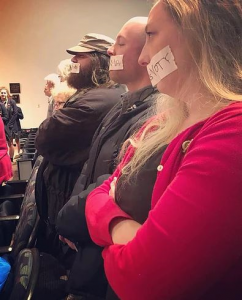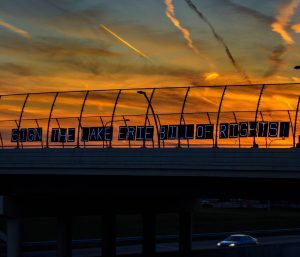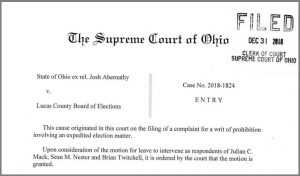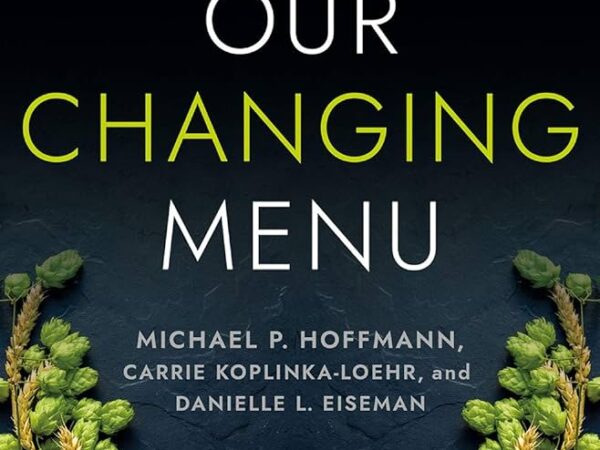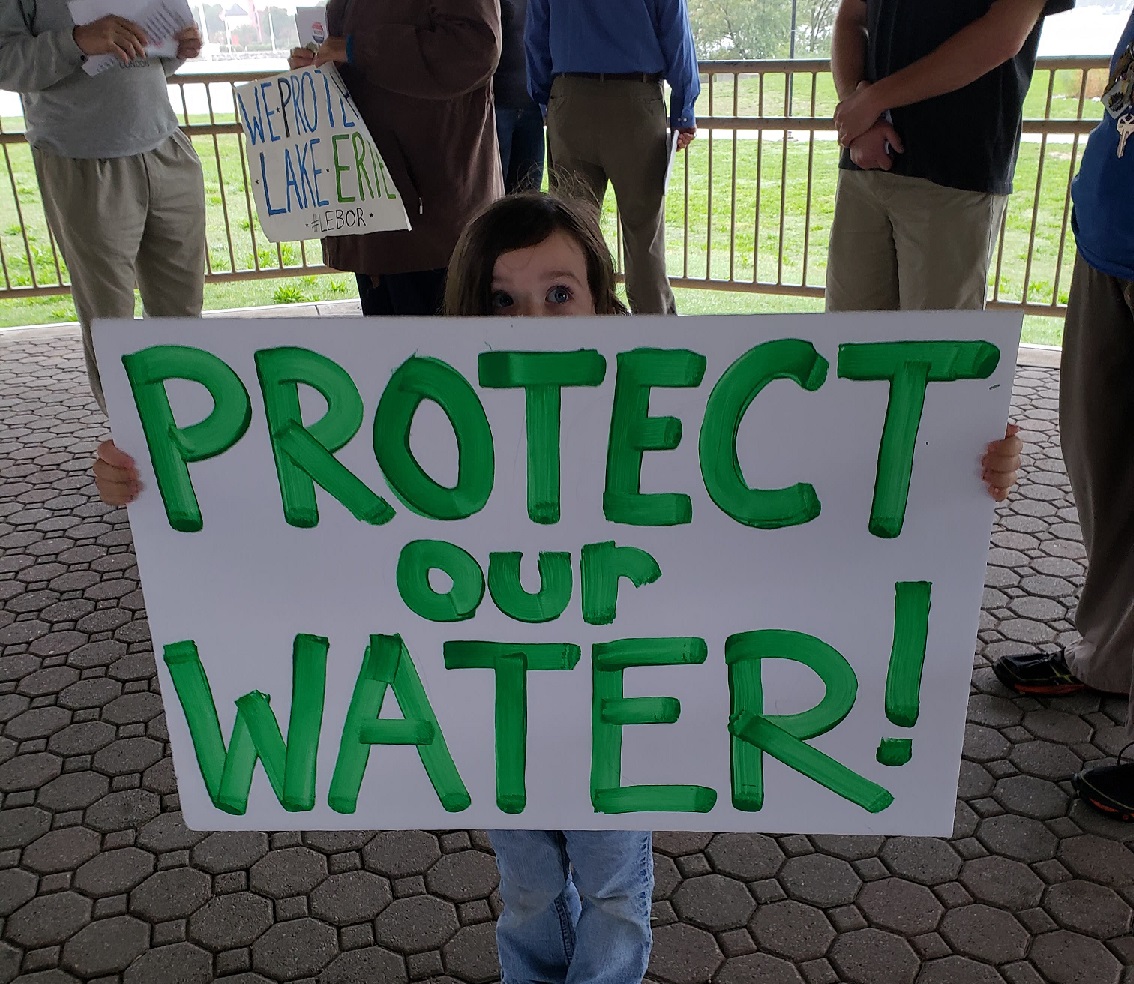
Ohio Supreme Court re-considering initiative
A second legal protest has temporarily blocked the Lake Erie Bill of Rights from appearing on Toledo ballots in a Feb. 26 special election.
Although the Lucas County Board of Elections in a 3-0 vote approved the ballot initiative last month, a second protest filed the day after Christmas on behalf of Josh Abernathy is before the Ohio Supreme Court and could, ultimately, prevent the grassroots initiative from appearing on the ballot. Abernathy is a Toledo-area trades union member who is represented by Columbus-based attorney Don McTigue.
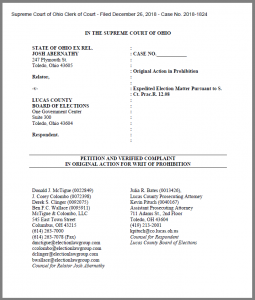
Abernathy v. Lucas County Board of Elections Case No. 2018-1824 (Click IMAGE to read the legal filing)
The special election in Toledo would be an opportunity to approve the very first Rights of Nature law in the U.S. that protects a specific ecosystem in its entirety, according to organizers. If passed by city voters, the Lake Erie Bill of Rights would theoretically enshrine the lake, its tributaries and their watersheds with the legal right “… to exist, flourish, and naturally evolve.”
Toledoans for Safe Water planned and worked for two years to get the issue on the ballot, eventually gaining the needed votes to place the issue before the Lucas County Board of Elections, which in August voted it down unanimously. The advocates then asked the Ohio Supreme Court to look at the issue.
Justices did, ruling against Toledoans for Safe Water in late October.
Click HERE to see the Ohio Supreme Court’s Case Information page.
The group then approached the Toledo City Council, which after a contentious public dialogue with Toledoans for Safe Water, agreed to a charter amendment which would place the initiative on the ballot. While the elections board was slated to vote on the ballot initiative Dec. 10, a last-minute protest by McTigue on behalf of Abernathy delayed action.
Election board approves ballot issue, Abernathy files second protest days later
When the Lucas County Board of Elections re-convened on Dec. 20 for a second vote on the proposed ballot initiative, they approved it unanimously, clearing the way for the Feb. 26 special election. But the day after Christmas the second protest postponed the Lake Erie Bill of Rights Issue, at least until it’s sorted out in court — again.
“This time the protest was filed against the Lucas County Board of Elections,” said Markie Miller, a Toledoans for Safe Water organizer. Miller said she was discouraged that board members, while they voted to approve the measure, made not-so-nice remarks about it. She characterized the remarks as “discouraging.”
The newest protest, Miller said, doesn’t seem so much different than the previous one: same attorney, same union member.
“To me it doesn’t seem like there were any new arguments. They’re just taking it back to the Ohio Supreme Court again. It’s just going in circles it feels like at this point,” Miller said.
While a number of organizations are on the record as being associated with a court brief against the issue, Miller said the Affiliated Construction Trades of Ohio seems to be most active, and that the International Brotherhood of Electrical Workers Local 8, which Abernathy is a member of, is affiliated with ACT Ohio.
“It’s hard to sit there and feel silenced and ignored when this one person doesn’t seem sincere and can basically keep an entire city from voting.” Miller said. “He doesn’t seem interested in talking to us or answering any questions.”
Miller said her group’s focus is moving forward, despite the uncertainty of the court’s future ruling. “Our challenge is going to be getting ahead of the issue, that this is anti-development and a job-killing bill. And that’s going to be a tough job,” she said.
Miller said that in August there was a robo-call campaign against the issue, even before the Lake Erie Bill of Rights was voted on the first time by the Lucas County Board of Elections.
Neither McTigue nor Abernathy responded to Great Lakes Now requests for comment.
Elections official says issue won’t add taxpayer cost to special election
LaVera Scott, Lucas County Board of Elections director, said the jail location and Lake Erie Bill of Rights issues will be the only two issues on the ballot, and that if the Lake Erie Bill of Rights issue doesn’t make it, only the jail issue will be on the ballot.
The Lake Erie issue, if it does appear, won’t cost taxpayers any extra money for the election.
“It’s not going to make a difference because it’s the same entity, the city of Toledo,” she explained. “So it’s going to be the same price whether it’s one issue or two issues. It’s the same voters, the same poll workers.”
The only exception, she said, could be a slightly higher cost in legal advertising for the election, since there could two issues instead of one.
When asked about voter turnout, Scott said she didn’t expect anything out of the ordinary. In general, special elections historically garner far fewer voters than regular elections. With that said, Scott did point out this particular election may prove slightly more difficult than others.
“We’ve never had a special election on that day, and that’s one thing, it’s not a normal election day. That’s going to be the biggest thing is to get people to understand,” Scott said. “Normally special elections are governed by the state and held on certain days governed by law. Because this election was placed on the ballot due to home rule, which would be the City of Toledo charter, it basically allows us to choose a date within a certain time period. That’s probably one of the biggest things, voters would not be accustomed to voting this day, because it’s not even a special election day.”
Scott said voters can still count on absentee ballot and early voting rules, which will be the same as any regular election.
Attorney believes business and money are at center of issue
Terry Lodge, an attorney with the Community Environmental Legal Defense Fund, represents Toledoans for Safe Water. He said it’s no surprise that a local union member is the plaintiff in the case, since earlier court briefs filed were done so on behalf of a number of northwest Ohio trades unions.
The latest protest filed with the Ohio Supreme Court required all arguments, including amicus briefs (also called friend-of-the-court briefs) be submitted by Jan. 7. Those are presented by parties interested in influencing the outcome of a lawsuit but who are not direct parties to the action. The amicus briefs filed in the first Ohio Supreme Court case included opposition from numerous organizations including those representing oil and gas industries, various crops and livestock farmers and trades unions. All parties submitted their arguments before the deadline.
There is no timeline for the Ohio Supreme Court
“The Supreme Court will take as long as they need to,” Lodge said. “It will either be on the ballot or it will be jettisoned.” Lodge said at the beginning of the year he’d really like the court to make a decision by Jan. 17th or 18th.” Obviously that time has passed. “Time is of the essence,” he said, pointing out that each day closer to the election is one day less which Lake Erie advocates have to inform and educate voters on the issue.
A last-minute court case on a ballot issue in the Youngstown area took the court weeks to decide, Lodge said. “It was something like April 19 or 20 that a decision was rendered. And it was a May 8 election. Not even three weeks before Election Day.”
With years of experience in community-oriented environmental law, Lodge said he expects a serious ad campaign by opponents if the issue remains on the Feb. 26 ballot. “They’ve got some pretty savvy people working for them,” he said.
On the upside, since there’s no injunction against the ballot initiative, the board of elections should go ahead with printing and distributing the ballots, Lodge said.
Great Lakes Now asked Lodge if the ordinance as written is even enforceable. He balked.
“I think that’s a gross misunderstanding,” he said of the idea the Lake Erie Bill of Rights in unenforceable, citing the fact that a good portion of Maumee Bay is within the city limits. “Excuse us if we have a right to regulate that water intake (located northeast of the city a few miles offshore)” he said. “Under state law, the City of Toledo has a right to protect it from pollution.”
Lake Erie advocates moving forward
Despite the latest in a string of obstacles, Miller said the group is already moving forward. Other means to get to Toledo voters aware of the special election and the Lake Erie issue are afoot.
“Win or lose, we’re going to keep pushing,” Miller said. “We’re not going away.” Since the last Toledo County Board of Elections vote, interest in Toledoans for Safe Water has risen exponentially, she said. And despite the fact a decision hasn’t been rendered by the court yet, Lake Erie advocates are campaigning as if they have the go-ahead.
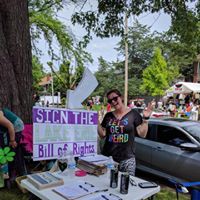
Lake Erie Bill of Rights advocates collect signatures, Photo by Toledoans for Safe Water via James Proffitt
“We’re not focused on that part of it,” she explained. “We’re doing as much campaigning and outreach as we can right now.” Miller said the group has been canvassing door-to-door and working precincts that have historically high voter turnout. That includes Point Place, a neighborhood on the water, which she said is an obvious place to start.
Miller said public appearances are in the queue, as well as a telephone campaign and other pro-Lake Erie actions. She said opposition has not yet made its appearance, other than push-polling, where calls are made to prospective voters to feel out their possible voting positions. Those who may be on the fence or inclined to vote for the Lake Erie Bill of Rights are then engaged in dialogue with the opposition.
And, Miller pointed out, the group also has support from some voters affiliated with Toledo-area trade unions. One resident, a member of a sheet metal workers union, and an avid angler, has been helping out with yard signs and other efforts and has posted pro-Lake Erie Bill of Rights information on Facebook.
“It’s really nice to have someone from that world that’s interested in the same things we are, fishing and the lake and the future of both,” she said. “No matter what happens, I think we’ll see an uptick in involvement.”
And even if the court rules against Toledoans for Safe Water, Miller said it will still be a win.
“Then hopefully we’ve got enough people ramped up so that they’ll think ‘Hey, we’ve got an election, and you’re on the ballot, and then you’re not on the ballot?’” she said. “That may factor into people thinking not only do we have an algae problem but also a democracy problem.”
Featured Image: Amelia Jankowski holds a sign, Photo by Toledoans for Safe Water via James Proffitt


